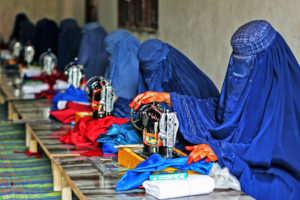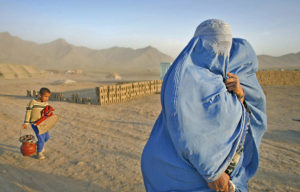In “The Impossible Fact”, the 20th-century German poet Christian Morgenstern tells the story of an academic who undergoes a traumatising experience. He staggers home, wraps damp cloths around his forehead and collapses into his armchair to process what has happened. In the end, he comforts himself by concluding that he must have imagined the whole thing, because if something “shouldn’t be true, it can’t be true”.
To many in the West, an Afghanistan that flourishes under the Taliban, or even one that survives, cannot possibly be true. Under their rule, the country can only be a place of unremitting failure and misery. The decision of Tobias Ellwood, then, as chair of the UK’s defence select committee, to post a video praising the Taliban for improving safety in Afghanistan was never going to find a warm reception.
In 2021, the UN issued a desperate warning about an impending disastrous famine in Afghanistan. The Taliban takeover and the exodus of international NGOs, they said, had caused a collapse in food supplies. They projected one million children were likely to die in the coming winter. And yet, winter came and passed without a famine and without mass deaths. Did the UN’s experts take that as a prompt to review their metrics? Not at all. Instead, they repeated the prediction for the next winter, and were wrong again. Afghanistan is an agricultural country with centuries-long experience in handling scarcity; accustomed to harsh winters and isolation, they knew what to do.
From the moment the Taliban seized Kabul in August 2021, analysts have been confidently predicting the imminent collapse of the Afghan economy. It’s not an unreasonable expectation. The nation’s financial reserves remain frozen. Sanctions have closed the door on foreign investment and business. The Central Bank is unable to access its funds, which are stuck in American and European banks. Not one country has recognised the Taliban government, and several of its key officials are on terrorist no-fly lists.
Nor do the Taliban have any of the requisite skills for governance. Their leadership consists of eccentric elderly religious figures and regional paramilitary commanders. The bulk of the Taliban are young, uneducated men who have never done anything but fight and have never lived anywhere but in remote rural areas. Anyone with education and professional skills decamped to the West. It could only be a matter of months before the ramshackle edifice collapsed. But to everyone’s incredulous amazement, including my own, Taliban Afghanistan lives on.
Ellwood was obviously naïve in his presentation — it’s never a good look for a Government official to be retweeted by the Taliban — but the crux of his message is largely accurate. Afghanistan’s drug trade has been almost eradicated, as confirmed by international watchdog agencies and satellite surveillance. The borders are mostly secure, and the Taliban have built good cooperation with neighbouring border police such as that of Uzbekistan. Even the International Crisis Group, no fan of the Taliban, has acknowledged that security across the country has improved, with the exception of pockets of anti-Taliban extremists.
Elsewhere, the economy is better than it was under the Western-installed and Western-funded governments, the latter having required near total international subsidy while the Taliban are managing not just on their own, but under sanctions. Improved security also means improved trade routes and revitalised agriculture. As the US Institute of Peace, another critic of the Taliban, notes: “the Taliban have taken some positive steps toward financial stability by publishing a fiscally responsible three-month budget and raising considerable amounts of domestic revenue — especially through customs duties, which have risen with a crackdown on corruption”.
When did any of the previous governments have fiscally responsible budgets? Never. According to Sigar, the US government’s Special Inspector General for Afghanistan Reconstruction, more than 80% of Afghan government spending on our watch was paid for by the US and its allies. As for corruption, Transparency International, the Europe-based watchdog agency, elevated Taliban-ruled Afghanistan by 24 places from where it had been under Western governments, from 174th to 150th, which the government-funded Voice of America termed “a remarkable status upgrade”.
Today, the biggest problem for the Taliban is Isis, which, despite some progress, remains a menace in the country. Given this is a concern we share, surely some cooperation would be wise — not least because there is no obvious alternative to Taliban rule on the horizon. If security is a priority, we can’t treat them as a pariah forever.
And yet, there is what we might call The Big Obstacle: what the Taliban are doing to half their population, the girls and women. Despite earlier promises to the contrary, they are back to their former ways, with girls banned from education after Grade 6 (below the age of 12), women’s employment strictly limited, female students excluded from universities, and strict rules on women’s dress and presence in public. As the UN made clear earlier this year, “20 years of progress for women and girls’ rights has been erased since Taliban takeover”. Although, for accuracy’s sake, this statement would have to read “for women and girls in middle and upper-class urban neighbourhoods”. The grim truth is that, in two decades, barely a dent has been made on female literacy, maternal and infant mortality, or the eradication of forced marriages and child brides in the poor neighbourhoods and rural areas where the overwhelming majority of Afghan women live.
All of which is a tragedy, and certainly does not make the even more restrictive policies of the Taliban any more palatable to us in the West, as the Taliban know well. So, given that they are seeking recognition and foreign investment, why won’t they budge on this matter?
While on other issues, the Taliban have been capable of change or compromise, on the issue of women they are completely intransigent. In his recent speech to mark Eid, Mullah Hibatullah Akhundzada, Afghanistan’s supreme leader, gave no ground, instead announcing that “necessary steps have been taken for the betterment of women as half of society in order to provide them with a comfortable and prosperous life according to the Islamic Shariah”. This was either an exercise in supreme cynicism or something he and his circle truly believe. In either case, we are dealing with a fundamental and irreconcilable difference in values.
So, can anything be done? Well, what we should be learning from the Afghan case is what not to do. As I have written before, we did the wrong thing, perhaps for the right reason. What we did, and what did not work, was to focus on a small group of middle and upper-class urban women, giving them a Western education, and then training in a series of “workshops” in skills that are helpful to activists only in the West. We wrote them a Constitution that guaranteed them seats in Parliament and funded them extensively. And this did produce a cadre of assertive, confident women, capable of aggressively demanding various rights and benefits — but only in a Western setting benignly overseen by us. Once the Taliban took over, they fled and Afghan women found themselves without an obvious grass-roots protest movement.
In Saudi Arabia, by contrast, without our instigation, women fought for their political and social rights, for the right to be in public, to get identity papers without the permission of a male guardian, to make decisions on matters affecting their children, to drive cars. Activists lost their jobs, some were jailed, but they persisted. And, over time, they succeeded in having all of those initially unthinkable demands met. Saudi Arabia today is a different universe from Saudi Arabia 20 years ago, and much of the credit goes to its courageous women. Pakistan, India, Malaysia, Indonesia — they all have indigenous, and influential, women’s movements who have made legal and social gains.
And there are courageous activist women holding their ground at this moment in Afghanistan. Typically, they stem from less privileged personal backgrounds than those who departed, and work through local NGOs with the support of friendships earlier established with women on the outside. They are continuing to offer basic social services to widows, orphans and indigent women. They are using modern technologies for underground education.
Equally encouraging are the deep divisions within Taliban ranks over the issue of women’s rights and female education. Quite a few Talibs send their own daughters to Pakistan or Qatar for access to education and continue to raise the matter internally. Other Islamic countries send regular delegations of Islamic clerics and scholars to Kandahar in an attempt to convince the hardliners that their stance is un-Islamic and is giving Islam a bad name.
There are many pressure points, then, and these would become more effective with the country’s opening. Ellwood’s suggestion that Western embassies should return was not as ill-judged as some insist. The problem is that the Taliban is the government. There is no alternative in the offing; our sanctions are not working, and we are not going to do what the Diaspora would like, and send our militaries back in. So, again, what should we do?
“Showing up is half the battle,” as Stephen Hawking said. Western presence means Western influence, dialogue, and the demonstration of alternative possibilities. Afghan women activists still in the country, and their civil society groups, are asking for this and we should listen to them; they are on the ground and they know best what will help them.
After Ellwood posted his video, he was tarred, feathered and threatened with expulsion, causing him to ignominiously cave in and agree that, like Mr Morgenstern’s academic, he must have “imagined the whole thing”. This dream, however, has cost us, and them, incalculable harm. This time, let’s focus on the facts rather than wishes.
Disclaimer
Some of the posts we share are controversial and we do not necessarily agree with them in the whole extend. Sometimes we agree with the content or part of it but we do not agree with the narration or language. Nevertheless we find them somehow interesting, valuable and/or informative or we share them, because we strongly believe in freedom of speech, free press and journalism. We strongly encourage you to have a critical approach to all the content, do your own research and analysis to build your own opinion.
We would be glad to have your feedback.
Source: UnHerd Read the original article here: https://unherd.com/



